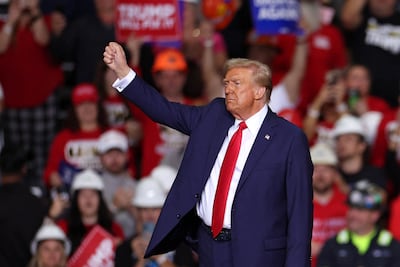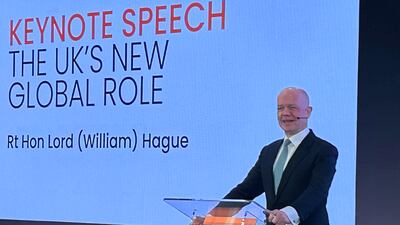The UK government would be wise to strengthen its relationship with the United States in the coming years, former British foreign secretary William Hague told a conference of investors and fund managers in London on Wednesday.
“China is not going to be the engine of economic growth for the UK economy,” Mr Hague told the Janus Henderson Investment Conference. “Nor is the EU. Looming over this is the United States.
"President-elect Trump likes the UK – good golf courses and he loves the royal family. So there’s every chance that the UK can win a ‘carve out’ from US tariffs, even if the European Union doesn’t.”
Geopolitical realignment was one of the main themes of the conference, which played host to around 200 finance professionals with around £1 trillion of assets under management, along with shifting demographics and the return of cost of capital as an issue for investors. “How do we invest depending on where the winds are blowing?” said Ali Dibadj, chief executive of Janus Henderson, adding that “this is an environment ripe for picking the wheat from the chaff.”

Iran a 'big issue'
Mr Hague pointed out that Mr Trump is at heart a dealmaker, and that this could well shape global events in the coming years. “Iran is going to be a big issue in 2025, because it has not been in as weak a position since the revolution,” he said. “Donald Trump could well do a deal with Iran.”
Mr Hague said there are three serious problems that the UK currently shares with the rest of Europe: lack of growth, Russia, and migration. He added that “no Western country can defend itself for more than a day without the technology of the United States”.
"The US holds all the cards,” he said. “We depend on the US for our security almost totally.”
Given that, and Donald Trump's possible insistence that Nato allies spend more on their own defence or face possible trade tariffs, at least some of the smart investment money in 2025 will once again be in defence companies.
“The opportunity is obviously with defence companies,” Julian McManus, portfolio manager of global equities with Janus Henderson told The National. “We think there are very attractively-valued defence companies like BAE Systems, which are going to see an acceleration in growth.”

In addition, Mr McManus said that because Donald Trump may also bring US tariffs to bear against China, “anything exposed to Chinese exports is going to have a lot of risk attached to it. Top of my list is ‘how do you navigate China risk with Trump driving policy?’, but at the same time there’s going to be opportunity as well," he said.
Commenting on China, Mr Hague said the “biggest geopolitical risk in the next five to 10 years is a crisis over Taiwan".
"Everybody is getting ready for the crisis over Taiwan, whatever form that takes, Mr Hague said. "The Chinese are utterly determined to have it and the whole world economy is incredibly dependent on it. In a crisis over Taiwan, Europe is on the side of the United States, and that determines what happens between now and then. Everybody has to allow for that in their decisions.”
'A year of change'
Meanwhile, because of the movements in interest rates expected this year, fixed income markets are becoming interesting again, according to Mr Dibadj, with some “really interesting pockets of value”.
“It’s definitely going to be a year of change,” Mr McManus told The National. “We’re going to see more volatility. It’s already showing up in fixed income markets as yields are backing up. I think it’s likely that you’re going to see some major policy pivots. That said, there’s going to be opportunity in there as well.”
As interest rates look to stay higher for longer, Mr McManus believes that investors will shift away from themes and move towards specific company valuations.
“We have to be sharper around what the returns are on offer to beat higher costs of capital," he told The National. "That means investors will have to be sharper around valuations than the last few years when rates have been relatively lower and investors could afford to be thematic – that focus shifts from the thematic to returns and fundamentals.”


